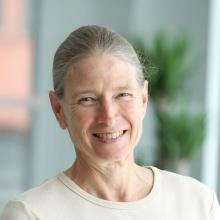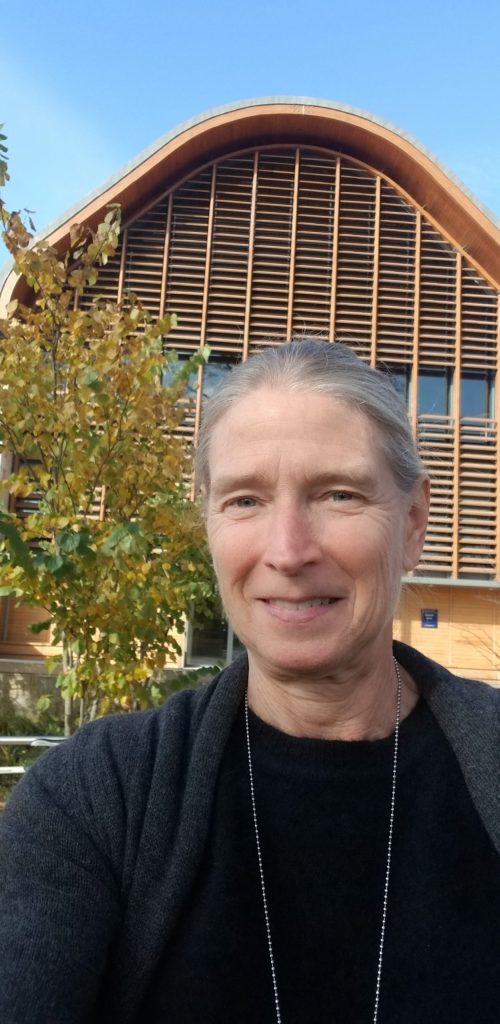IE BOV Member Seymour ’81 spends semester as Yale’s McCluskey Visiting Fellow in Conservation; selected to U.S. Department of State’s Science Envoy
March 31, 2023
Every Monday morning last fall, Frances Seymour boarded a train from Washington, D.C. to New Haven, CT, a five-hour trek that delivered her to Yale University where she was a Dorothy S. McCluskey Visiting Fellow in Conservation at the Yale School of the Environment. The semester-long fellowship brings practitioners of conservation, particularly women, who do work in developing countries to the university to pursue independent research, enhance collaborations with environmental organizations and provide professional opportunities for students.
“I really wanted to use this opportunity to interact with students and faculty and just be a resource to them, but also learn from them,” Seymour said. “I participated in several courses obviously not for credit, but for things I wanted to learn about, including a seminar series on forest carbon crediting in the U.S., which I didn’t know much about because my focus has always been on the tropics.”
Seymour, a distinguished senior fellow at the World Resources Institute (WRI) in Washington, D.C., and board member of the UNC Institute for the Environment, has spent her career investigating tropical forests and climate change in developing countries, especially Indonesia. She co-authored “Why Forests? Why Now? The Science, Economics and Politics of Tropical Forests and Climate Change” in 2016, which shares the latest evidence on the importance of conserving tropical forests as a way to mitigate climate change. In October, Seymour finalized a report titled, “Not Just Carbon: Capturing All the Benefits of Forests for Stabilizing the Climate from Local to Global Scales,” which examines all the ways forests affect the climate.
“Professionally it seemed like a good moment for me to get a little distance from my day to day involvements to reassess what my priorities were and what I wanted to do,” she said.

While at Yale, she supervised ten students. She assigned each student a particular topic from her most recent report to develop a short blog post targeted at a specific policy audience. The blog posts will be featured on the WRI website.
Seymour appreciated the interaction with the students.
“Through other experiences I’ve had over the years, I always enjoy being with students both learning from them their fresh new perspectives on things, but also being a resource to an extent that I can in both career advice and encouragement and also just helping them network—that gives me a lot of satisfaction.”
A highlight of the fellowship for Seymour was participating in classes.
“The most eye opening one for me was a course on tribal lands in the United States,” she said. “It was every Wednesday morning for three hours and it really just revealed to me the huge gaps in my own education on indigenous peoples issues here. I discovered I knew more about those issues in Indonesia. I really appreciated that course.”
In addition to attending classes, she also helped students prepare to attend international climate and biodiversity conferences, like the UNFCCC (United Nations Framework Convention on Climate Change). She lectured in various classes and seminars and brainstormed with Yale’s Chapter of International Society of Tropical Foresters to plan their conference in February.
“I was so busy at the School of Environment that I had this constant anxiety that I was missing out on all of the other opportunities on the wider Yale campus,” she quipped. “It wasn’t until my husband came to visit after Thanksgiving that I finally did some of the other things around town, like go for a campus tour, or eat the famous New Haven pizza, or go to the famous Beinecke Rare Book and Manuscript Library.”
Although her McClusky Fellowship technically ended in December, Seymour is continuing her affiliation with Yale this spring as a guest instructor for a seminar series on tropical forest carbon crediting.
“Through the various classes I participated in, the students I supervised, being part of the faulty team for the carbon crediting seminar, I’ve just developed all of these relationships that are continuing and I think they are mutually enriching,” Seymour said. “I think most importantly its having developed a web of personal and professional relationships with a whole set of new people including a handful of faculty associated with the Yale School of the Environment.”
Another highlight of her time in New Haven was exploring a very personal connection she had to Yale: her father, Rev. Robert E. Seymour, Jr., a renowned civil rights activist and pastor in Chapel Hill, NC, attended divinity school at Yale.
“The School of the Environment is just down the hill from the divinity school,” she said. “One of the first things I did when I got up there was contact the dean of the divinity school and get a tour. There was a personal connection to being in New Haven so many decades after my father’s time.”
Seymour relished exploring where her father may have lived and ate, where he may have practiced preaching and spent time writing. Robert Seymour’s papers are archived in UNC’s Wilson Special Collections Library, some of which date back to his time at Yale. When Rev. Seymour died in 2020 at the age of 95, he left a gift to fund diversity, equity and inclusion efforts in the College of Arts and Sciences.
As for 2023, Seymour is not slowing down. In February, Seymour embarked on a new adventure as a member of the U.S. Department of State’s Science Envoy Program.
As a recognized expert in the role of tropical forests in addressing climate change and sustainable development, Seymour is one of seven citizen ambassadors chosen to represent the United States in collaborative efforts around the world that aim to solve shared challenges.
“I am honored to serve as a U.S. Science Envoy in the distinguished company of this group and to have the opportunity to raise awareness of the importance of forests to both climate and development objectives,” Seymour said in a press release from WRI. “In light of the immense threats facing the world’s forests, it’s more important than ever that we collaborate across national boundaries to find common solutions to integrate the many benefits of forests into climate action strategies.”
